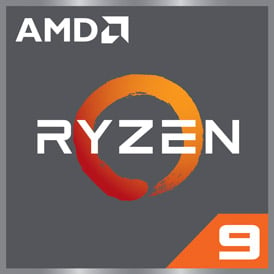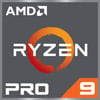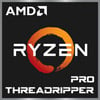
AMD Ryzen 9 7950X3D Benchmark, Test and specs
Last updated:
The AMD Ryzen 9 7950X3D has 16 cores with 32 threads and is based on the 6. gen of the AMD Ryzen 9 series. The processor uses a mainboard with the AM5 (LGA 1718) socket and was released in Q1/2023. The AMD Ryzen 9 7950X3D scores 2,223 points in the Geekbench 5 single-core benchmark. In the Geekbench 5 multi-core benchmark, the result is 23,460 points.

| Name: | AMD Ryzen 9 7950X3D |
|---|---|
| Family: | AMD Ryzen 9 (35) |
| CPU group: | AMD Ryzen 7000 (14) |
| Architecture: | Raphael (Zen 4) |
| Segment: | Desktop / Server |
| Generation: | 6 |
| Predecessor: | -- |
| Successor: | -- |
CPU Cores and Base Frequency
The AMD Ryzen 9 7950X3D has 16 CPU cores and can calculate 32 threads in parallel. The clock frequency of the AMD Ryzen 9 7950X3D is 4.20 GHz (5.70 GHz). The number of CPU cores greatly affects the speed of the processor and is an important performance indicator.
| CPU Cores / Threads: | 16 / 32 |
|---|---|
| Core architecture: | normal |
| Cores: | 16x Zen 4 |
| Hyperthreading / SMT: | Yes |
|---|---|
| Overclocking: | No |
| Frequency: | 4.20 GHz |
| Turbo Frequency (1 Core): | 5.70 GHz |
| Turbo Frequency (16 Cores): | 5.00 GHz |
Internal Graphics
The AMD Ryzen 9 7950X3D has integrated graphics, called iGPU for short. Specifically, the AMD Ryzen 9 7950X3D uses the AMD Radeon Graphics (Raphael), which has 128 texture shaders and 2 execution units. The iGPU uses the system's main memory as graphics memory and sits on the processor's die.
| GPU name: | AMD Radeon Graphics (Raphael) |
|---|---|
| GPU frequency: | 0.40 GHz |
| GPU (Turbo): | 2.20 GHz |
| Compute units: | 2 |
| Shader: | 128 |
| Hardware Raytracing: | No |
| Release date: | Q3/2022 |
| Max. displays: | 3 |
|---|---|
| Generation: | 9 |
| Direct X: | 12 |
| Technology: | 5 nm |
| Max. GPU Memory: | 8 GB |
| Frame Generation: | No |
Hardware codec support
A photo or video codec that is accelerated in hardware can greatly accelerate the working speed of a processor and extend the battery life of notebooks or smartphones when playing videos.
| h265 / HEVC (8 bit): | Decode / Encode |
|---|---|
| h265 / HEVC (10 bit): | Decode / Encode |
| h264: | Decode / Encode |
| VP8: | Decode / Encode |
| VP9: | Decode / Encode |
| AV1: | Decode |
|---|---|
| AVC: | Decode / Encode |
| VC-1: | Decode |
| JPEG: | Decode / Encode |
Memory & PCIeThe processor can use up to 128 GB memory in 2 (Dual Channel) memory channels. The maximum memory bandwidth is 83.2 GB/s. The memory type as well as the amount of memory can greatly affect the speed of the system. |
|
| Memory type: | Memory bandwidth: |
|---|---|
| DDR5-5200 | 83.2 GB/s |
| Max. Memory: | 128 GB |
| Memory channels: | 2 (Dual Channel) |
| ECC: | Yes |
| PCIe: | 5.0 x 24 |
| PCIe Bandwidth: | 94.5 GB/s |
Thermal ManagementThe thermal design power (TDP for short) of the processor is 120 W. The TDP specifies the necessary cooling solution that is required to cool the processor sufficiently. The TDP usually gives a rough idea of the actual power consumption of the CPU. |
|
|---|---|
| TDP (PL1 / PBP): | 120 W |
| TDP (PL2): | 162 W |
| TDP up: | -- |
| TDP down: | -- |
| Tjunction max.: | 89 °C |
Technical details
The AMD Ryzen 9 7950X3D is made in 5 nm. The smaller the manufacturing process of a CPU, the more modern and energy-efficient it is. Overall, the processor has 144.00 MB cache. A large cache can greatly speed up the processor's speed in some cases such as games.
| Technology: | 5 nm |
|---|---|
| Chip design: | Chiplet |
| Socket: | AM5 (LGA 1718) |
| L2-Cache: | 16.00 MB |
| L3-Cache: | 128.00 MB |
| AES-NI: | Yes |
| Operating systems: | Windows 10, Windows 11, Linux |
| Virtualization: | AMD-V, SVM |
|---|---|
| Instruction set (ISA): | x86-64 (64 bit) |
| ISA extensions: | SSE4a, SSE4.1, SSE4.2,FMA3, AVX2, AVX512 |
| Release date: | Q1/2023 |
| Release price: | -- |
| Part Number: | -- |
| Documents: | Technical data sheet |
Rate this processor
Benchmark results

The benchmark results for the AMD Ryzen 9 7950X3D have been carefully checked by us. We only publish benchmark results that have been created by us or that have been submitted by a visitor and then checked by a team member. All results are based on and fullfill our benchmark guidelines.
Screenshots:
Screenshots:
- Geekbench 5.4.5 (32 GB DDR5-6000), Windows 11 Pro
- Geekbench 6.0.0 (32 GB DDR5-6000), Windows 11 Pro
- Geekbench 5.4.5 (32 GB DDR5-6000), Windows 11 Pro
- Geekbench 6.0.0 (32 GB DDR5-6000), Windows 11 Home
Cinebench 2024 (Single-Core)
The Cinebench 2024 benchmark is based on the Redshift rendering engine, which is also used in Maxon's 3D program Cinema 4D. The benchmark runs are each 10 minutes long to test whether the processor is limited by its heat generation.

|
AMD Ryzen 9 7900X
12C 24T @ 5.60 GHz |
||

|
AMD Ryzen 9 7900X3D
12C 24T @ 5.60 GHz |
||

|
Apple M2 Pro (12-CPU 19-GPU)
12C 12T @ 3.50 GHz |
||
|
|
AMD Ryzen 9 7950X3D
16C 32T @ 5.70 GHz |
||

|
Apple M2 Max (30-GPU)
12C 12T @ 3.50 GHz |
||

|
Apple M2 Max (38-GPU)
12C 12T @ 3.50 GHz |
||

|
Intel Core i9-13900F
24C 32T @ 5.60 GHz |
||
Cinebench 2024 (Multi-Core)
The Multi-Core test of the Cinebench 2024 benchmark uses all cpu cores to render using the Redshift rendering engine, which is also used in Maxons Cinema 4D. The benchmark run is 10 minutes long to test whether the processor is limited by its heat generation.

|
Intel Core i9-13900K
24C 32T @ 5.80 GHz |
||

|
Intel Core i9-13900KF
24C 32T @ 5.80 GHz |
||

|
AMD Ryzen 9 7950X
16C 32T @ 5.70 GHz |
||
|
|
AMD Ryzen 9 7950X3D
16C 32T @ 5.70 GHz |
||

|
Intel Core i7-14700KF
20C 28T @ 5.60 GHz |
||

|
Intel Core i7-14700K
20C 28T @ 5.60 GHz |
||

|
AMD Ryzen Threadripper 3960X
24C 48T @ 4.50 GHz |
||
Cinebench R23 (Single-Core)
Cinebench R23 is the successor of Cinebench R20 and is also based on the Cinema 4 Suite. Cinema 4 is a worldwide used software to create 3D forms. The single-core test only uses one CPU core, the amount of cores or hyperthreading ability doesn't count.

|
Intel Core i9-12900KS
16C 24T @ 5.50 GHz |
||

|
AMD Ryzen 9 7950X
16C 32T @ 5.70 GHz |
||

|
Intel Core i9-13900HX
24C 32T @ 5.40 GHz |
||
|
|
AMD Ryzen 9 7950X3D
16C 32T @ 5.70 GHz |
||

|
AMD Ryzen 9 7900X3D
12C 24T @ 5.60 GHz |
||

|
AMD Ryzen 9 7900X
12C 24T @ 5.60 GHz |
||

|
Intel Core i5-13600KF
14C 20T @ 5.10 GHz |
||
Cinebench R23 (Multi-Core)
Cinebench R23 is the successor of Cinebench R20 and is also based on the Cinema 4 Suite. Cinema 4 is a worldwide used software to create 3D forms. The multi-core test involves all CPU cores and taks a big advantage of hyperthreading.

|
Intel Core i9-14900K
24C 32T @ 5.70 GHz |
||

|
Intel Core i9-14900KF
24C 32T @ 5.70 GHz |
||

|
AMD Ryzen 9 7950X
16C 32T @ 5.20 GHz |
||
|
|
AMD Ryzen 9 7950X3D
16C 32T @ 5.00 GHz |
||

|
AMD EPYC 7502P
32C 64T @ 3.00 GHz |
||

|
AMD Ryzen Threadripper 3960X
24C 48T @ 4.00 GHz |
||

|
Intel Core i9-14900F
24C 32T @ 5.40 GHz |
||
Geekbench 5, 64bit (Single-Core)
Geekbench 5 is a cross plattform benchmark that heavily uses the systems memory. A fast memory will push the result a lot. The single-core test only uses one CPU core, the amount of cores or hyperthreading ability doesn't count.

|
AMD Ryzen 9 7950X
16C 32T @ 5.70 GHz |
||

|
AMD Ryzen 9 7900X3D
12C 24T @ 5.60 GHz |
||

|
AMD Ryzen 9 7900X
12C 24T @ 5.60 GHz |
||
|
|
AMD Ryzen 9 7950X3D
16C 32T @ 5.70 GHz |
||

|
Intel Core i9-13900KS
24C 32T @ 6.00 GHz |
||

|
AMD Ryzen 9 PRO 7945
12C 24T @ 5.40 GHz |
||

|
AMD Ryzen 9 7900
12C 24T @ 5.40 GHz |
||
Geekbench 5, 64bit (Multi-Core)
Geekbench 5 is a cross plattform benchmark that heavily uses the systems memory. A fast memory will push the result a lot. The multi-core test involves all CPU cores and taks a big advantage of hyperthreading.

|
Intel Core i9-13900K
24C 32T @ 5.50 GHz |
||

|
AMD Ryzen Threadripper PRO 5965WX
24C 48T @ 4.00 GHz |
||

|
Intel Xeon W-3175X
28C 56T @ 3.80 GHz |
||
|
|
AMD Ryzen 9 7950X3D
16C 32T @ 5.00 GHz |
||

|
Intel Xeon Gold 6312U
24C 48T @ 2.80 GHz |
||

|
AMD EPYC 7453
28C 56T @ 3.25 GHz |
||

|
AMD EPYC 9174F
16C 32T @ 4.15 GHz |
||
Geekbench 6 (Single-Core)
Geekbench 6 is a benchmark for modern computers, notebooks and smartphones. What is new is an optimized utilization of newer CPU architectures, e.g. based on the big.LITTLE concept and combining CPU cores of different sizes. The single-core benchmark only evaluates the performance of the fastest CPU core, the number of CPU cores in a processor is irrelevant here.

|
Intel Core i9-14900HX
24C 32T @ 5.80 GHz |
||

|
AMD Ryzen 9 7900X
12C 24T @ 5.60 GHz |
||

|
Intel Xeon w7-2495X
24C 48T @ 4.80 GHz |
||
|
|
AMD Ryzen 9 7950X3D
16C 32T @ 5.70 GHz |
||

|
Intel Core i7-14700KF
20C 28T @ 5.60 GHz |
||

|
Intel Core i7-14700K
20C 28T @ 5.60 GHz |
||

|
AMD Ryzen 7 7700X
8C 16T @ 5.40 GHz |
||
Geekbench 6 (Multi-Core)
Geekbench 6 is a benchmark for modern computers, notebooks and smartphones. What is new is an optimized utilization of newer CPU architectures, e.g. based on the big.LITTLE concept and combining CPU cores of different sizes. The multi-core benchmark evaluates the performance of all of the processor's CPU cores. Virtual thread improvements such as AMD SMT or Intel's Hyper-Threading have a positive impact on the benchmark result.

|
Intel Core i9-13900
24C 32T @ 5.30 GHz |
||

|
Intel Xeon Gold 6442Y
24C 48T @ 2.00 GHz |
||

|
AMD Ryzen Threadripper PRO 7975WX
32C 64T @ 4.00 GHz |
||
|
|
AMD Ryzen 9 7950X3D
16C 32T @ 5.00 GHz |
||

|
Apple M3 Max (14-CPU 30-GPU)
14C 14T @ 3.60 GHz |
||

|
AMD Ryzen 9 7900X
12C 24T @ 5.40 GHz |
||

|
Intel Core i7-14700F
20C 28T @ 5.30 GHz |
||
iGPU - FP32 Performance (Single-precision GFLOPS)
The theoretical computing performance of the internal graphics unit of the processor with simple accuracy (32 bit) in GFLOPS. GFLOPS indicates how many billion floating point operations the iGPU can perform per second.

|
Apple A12 Bionic
Apple A12 @ 1.13 GHz |
||

|
MediaTek Dimensity 820
ARM Mali-G57 MP5 @ 0.90 GHz |
||

|
Qualcomm Snapdragon 835
Qualcomm Adreno 540 @ 0.71 GHz |
||
|
|
AMD Ryzen 9 7950X3D
AMD Radeon Graphics (Raphael) @ 2.20 GHz |
||

|
AMD Ryzen 5 PRO 7645
AMD Radeon Graphics (Raphael) @ 2.20 GHz |
||

|
AMD Ryzen 7 PRO 7745
AMD Radeon Graphics (Raphael) @ 2.20 GHz |
||

|
AMD Ryzen 9 PRO 7945
AMD Radeon Graphics (Raphael) @ 2.20 GHz |
||
Estimated results for PassMark CPU Mark
Some of the CPUs listed below have been benchmarked by CPU-monkey. However the majority of CPUs have not been tested and the results have been estimated by a CPU-monkey’s secret proprietary formula. As such they do not accurately reflect the actual Passmark CPU mark values and are not endorsed by PassMark Software Pty Ltd.

|
AMD Ryzen Threadripper PRO 5965WX
24C 48T @ 4.00 GHz |
||

|
AMD EPYC 7742
64C 128T @ 2.80 GHz |
||

|
Intel Core i9-14900KS
24C 32T @ 5.90 GHz |
||
|
|
AMD Ryzen 9 7950X3D
16C 32T @ 5.00 GHz |
||

|
AMD Ryzen 9 7950X
16C 32T @ 5.20 GHz |
||

|
AMD Ryzen Threadripper 3970X
32C 64T @ 3.80 GHz |
||

|
AMD Ryzen Threadripper PRO 3975WX
32C 64T @ 3.75 GHz |
||
CPU performance per watt (efficiency)
Efficiency of the processor under full load in the Cinebench R23 (multi-core) benchmark. The benchmark result is divided by the average energy required (CPU package power in watts). The higher the value, the more efficient the CPU is under full load.

|
AMD Ryzen 7 7840HS
15,930 CB R23 MC @ 55 W |
||

|
AMD Ryzen 7 8845HS
15,930 CB R23 MC @ 55 W |
||

|
AMD Ryzen 7 PRO 8845HS
15,930 CB R23 MC @ 55 W |
||
|
|
AMD Ryzen 9 7950X3D
38,581 CB R23 MC @ 136 W |
||

|
AMD Ryzen Threadripper 7980X
98,322 CB R23 MC @ 349 W |
||

|
Apple M1 Pro (10-CPU 16-GPU)
12,390 CB R23 MC @ 45 W |
||

|
Apple M1 Pro (10-CPU 14-GPU)
12,390 CB R23 MC @ 45 W |
||
Benchmarks

Cinebench 2024 (SC)
272 entries
272 entries

Cinebench 2024 (MC)
271 entries
271 entries

Cinebench R23 (SC)
586 entries
586 entries

Cinebench R23 (MC)
565 entries
565 entries

Geekbench 5 (SC)
2,488 entries
2,488 entries

Geekbench 5 (MC)
2,461 entries
2,461 entries

Geekbench 6 (SC)
1,755 entries
1,755 entries

Geekbench 6 (MC)
1,703 entries
1,703 entries

FP32 SP (iGPU)
2,042 entries
2,042 entries

3DMark Timespy (iGPU)
516 entries
516 entries

PassMark CPU-Mark
2,392 entries
2,392 entries

CPU performance per watt (efficiency)
109 entries
109 entries
Description of the processor
With the AMD Ryzen 9 7950X3D, AMD currently has its fastest gaming processor on offer. Like the very successful AMD Ryzen 7 5800X3D, the AMD Ryzen 9 7950X3D also uses a significantly larger level 3 cache, which is connected to the CPU using the 3D stacking process. The manufacturing process of the cache is eponymous here.Compared to the AMD Ryzen 9 7950X without a 3D cache, the AMD Ryzen 9 7950X3D can access 128 MB of level 3 cache, the normal model has to be satisfied with half (64 MB). It is the first time that AMD has clocked its 3D processors at a similarly high rate as the normal models. This was made possible by AMD separating the clock frequency of the cache from that of the rest of the CPU.
Specifically, the AMD Ryzen 9 7950X3D clocks at 4.2 GHz in the base, in turbo mode up to 5.7 GHz are possible. When all 16 CPU cores are loaded, the AMD Ryzen 9 7950X3D still achieves a high clock frequency of 5.0 GHz. Unlike Intel, AMD has so far relied on CPU cores of the same size, while Intel uses a hybrid structure of larger and smaller CPU cores (P + E CPU cores).
For the first time, AMD is also installing an integrated GPU (iGPU) in its desktop processors in the Ryzen 7000 series. The AMD Radeon Graphics built into the AMD Ryzen 9 7950X3D uses only two execution units with 128 shaders and is more or less only used for image output. The graphics card is too slow for more demanding tasks or even games.
The AMD Ryzen 7000 processors are using the new socket AM5 for the first time, which, in addition to faster main memory (currently a maximum of DDR5-5200), also makes higher power consumption possible. The AMD Ryzen 9 7950X3D has a TDP of 120 watts and can consume a maximum of 170 watts via the PL2 configuration with sufficient cooling.
Like the predecessor AMD Ryzen 7 5800X3D, the AMD Ryzen 9 7950X3D is also somewhat more temperature-sensitive and has a Tj max of 89°C. It is not approved for overclocking, but is allowed to use the AMD PBO2 automatic clock increase for the first time.
Popular comparisons
back to index




